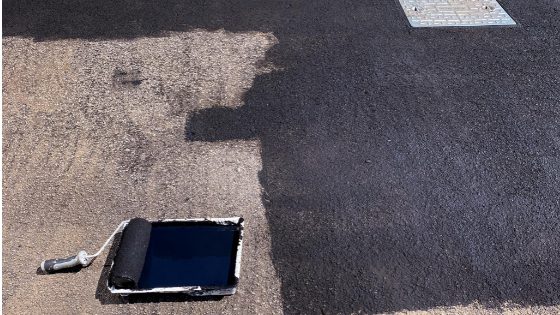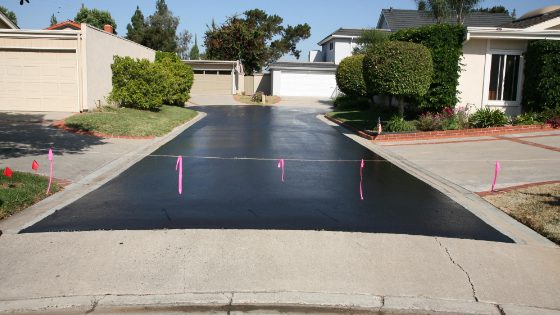When to Seal Your Driveway
Everyone has cracks in their driveway, but is it time to look for a fix? How often to seal your driveway is one of the most commonly asked questions of homeowners. Sealing your driveway is always a good idea if you live in an area that gets lots of rain or snow. By sealing your driveway can prevent snow and ice from building up which can lead to hazards. Properly sealing will also help to protect the surface against all types water damage in the future.
You should seal your driveway every two to five years, to minimize the damage done by these potential forces. The best time of year to consider a sealing project is preferably in summer months, or any time of year when the weather is hot. The hot weather allows the driveway sealant to expand and fill cracks in ways that are more effective than it would in cold weather.
Sealing your driveway is not necessary if you live in a climate where the ground is frozen solid for the entire winter. This is due to the constant temperature, which keeps the surface in a stable condition for these months. What causes asphalt and concrete to crack and need sealant is the change in temperature from hot to cold, which creates expansion and contraction. This expansion and contraction, along with the expansion of freezing water and snow, causes driveways to crack.

Choosing the Right Driveway Sealant
Some factors that can affect the effectiveness of a driveway sealer include weather conditions, surface type, age of the drive, presence of water spots, among many more. There are also several varieties of driveway sealer. The condition of your driveway and the material it’s made of determines which type you need.
If you’re sealing an asphalt surface, use a latex-based sealer . Avoid oil-based sealers because they will likely crack over time. Siloxane and acrylic sealants work well with concrete driveways . It’s best to avoid high-gloss, which could make the concrete surface slippery. Every concrete surface should be easy to walk or drive on without the risk of slipping. Generally, penetrating sealers offer the greatest traction as they don’t form a film over your driveway.
Different types of sealcoating options offer different levels of color and gloss, making it easy to customize the appearance of your driveway. While both styles offer good performance, it’s important to consider how often you’ll want to reapply when choosing your asphalt driveway sealer. Depending on the product, a driveway sealer may require periodic application or continuous use in order to maintain its effectiveness.
What to Consider when Choosing the Best Asphalt Driveway Sealant
When choosing the best asphalt sealant, you want to make sure that you purchase a product that is designed to provide maximum protection for your driveway. You want to make sure that you are buying a product that is designed to provide a long-lasting seal that will keep water out of the driveway.
Blacktop sealers are available in a variety of types and prices. Safety is important when using blacktop sealers, as they should be easy to walk or drive on without risk of slipping. Penetrating sealers offer the greatest traction and are less slippery than film-forming sealers. Appearance can be customized with different types of driveway coatings, from matte to high gloss.
There are two types of asphalt driveway sealers: film-forming and penetrating. Film-forming sealers typically last for one to three years, while a penetrating sealer can last up to ten years. It’s important to consider how often you’ll want to reapply when choosing your asphalt driveway sealer.
Coal Tar Sealants
Coal tar sealers are made from coal tar, a sticky black substance derived from bituminous coal. Coal tar goes on as a syrupy, black liquid and then forms a tough surface on asphalt known as a “sealcoat.” Application is not a DIY project, as it requires industrial equipment that heats the tar to liquefy it. Coal tar sealers can effectively fill small cracks, seal, and recoat asphalt driveways with a protective coating that lasts up to 4 years. Coal tar sealers are not considered environmentally friendly, and some states and communities have banned their use.
Asphalt-Based Sealants
Asphalt-based sealers are composed of asphalt cement and emit fewer toxic fumes, making them a popular choice for most homeowners. They can be applied by a professional driveway resurfacing crew or a knowledgeable DIYer. There are several different types of asphalt-based driveway sealers, each with different ingredients and benefits. These sealants offer more driveway traction than acrylic-resin sealers. They also prevent driveways from absorbing damaging particles of water and dirt.
Plain Surface Sealant
Plain surface sealers are available in black liquid or sand-free powder form and can be applied with a heavy-duty paint roller. They are intended for use on a driveway that is in relatively good condition, without potholes or sinkholes. Plain sealers do not contain sand, so holes or cracks should be patched and filled before applying the sealer.
Some plain sealers are low-VOC and produce minimal fumes when applied. Asphalt (blacktop) driveways can develop spider web cracks and low spots over time, which can lead to larger problems such as potholes. Typically this type of driveway sealant is the most common for DIY projects due to the relatively inexpensive prices.
Fill-and-Seal Products
Fill-and-seal products for asphalt surfaces are also DIY-friendly. A coating will last up to 3 years on average. Unlike other sealants, this specifically type of driveway sealant fills hole sand cracks as well as sealing. Where as others, you must fill the hole or crack yourself before sealing.

What to Consider when Choosing the Best Concrete Driveway Sealant
Concrete can be very hard to maintain, so it is important to choose the best concrete driveway sealer that will allow you to maintain your driveway. You can start by considering the type of concrete you have, the climate in which you live and the amount of wear and tear on your driveway. Concrete is porous and can be damaged by freeze-thaw cycles much easier than other surfaces. Concrete sealers protect the concrete from stains, rust, and damage from chemicals and slow down freeze-thaw cycles that cause damage.
You need to choose a sealer that will cover the surface of the driveway properly in order to extend its life. Sealer is a substance that helps to protect the concrete surface from moisture and atmospheric elements.
There are many types of sealers available on the market, each with its own specific benefits. Before choosing a sealer, it is important to consider the type of driveway you have and the conditions under which it will be used. Concrete sealers can be applied by brush, spray or roller, and should be applied in a uniform manner to ensure even coverage.
Cure and Seal Products
The standard method of curing is wetting the new concrete down multiple times a day for a week, but this may not be feasible in some cases.
A cure and seal product, which protects the driveway for up to 3 years, is a reasonable alternative when wetting down isn’t feasible. What this type of sealant does is capture moisture inside a membrane in the sealant that allows your concrete driveway to remain at the optimal level of moisture.
Penetrating Sealants
Penetrating sealers should not be applied before new concrete is completely cured, which is at least 28 days.
A single application can last from 5 to 10 years, based on quality, weather conditions, and the manufacturer’s suggestion. Penetrating sealers bond with the particles in the porous concrete surface to prevent stains and keep water from soaking in, which reduces the risk of cracking due to freezing. Penetrating sealers offer more driveway traction than acrylic-resin sealers. Penetrating sealers are also less likely to form a slippery film, which allows your driveway to remain safe during this process.
Mold Inhibitors
Concrete sealers are available with mold and mildew inhibitors. This is a very popular choice for those with concrete driveways. Due to the porous nature of concrete, stains, mold, and mildew build up are very common. Mold and mildew can alter the look of a concrete surface, and make it look old and worn beyond its years. Before applying a concrete sealer that prevents mold or mildew, any existing staining must be removed. After applying, your concrete driveway should remain stain free for many years.

Surface Effects
All sealants will have some kind of positive effect on your driveway. The only choice you have to make is which benefits you feel is best for your needs and your driveway. Plain asphalt sealants can be applied with a paint roller to create a textured, nonslip surface, which is an easy way to take control of the situation yourself. Other sealants can help keep your brand new driveway look new for years to come. Some plain sealers are low-VOC, meaning they create minimal, if any, noxious fumes, which again is very appealing to a DIYer. Regardless of what surface material your driveway is made from, there is a driveway sealant for you. A surface sealer offers an added layer of protection that can last up to 3 years and a brand new look that will keep you happy.







